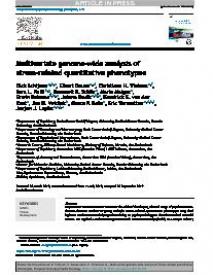Multivariate genome-wide analysis of stress-related quantitative phenotypes
Exposure to traumatic stress increases the odds of developing a broad range of psychiatric conditions. Genetic studies targeting multiple stress-related quantitative phenotypes may shed light on mechanisms underlying vulnerability to psychopathology in the aftermath of stressful events. We applied a multivariate genome-wide association study (GWAS) to a unique military cohort (N=583) in which we measured biochemical and behavioral phenotypes.
The availability of pre- and post-deployment measurements allowed to capture changes in these phenotypes in response to stress. For genome-wide significant loci, we performed functional annotation, phenome-wide analysis and quasi-replication in PTSD case-control GWASs. We discovered one genetic variant reaching genome-wide significant association, surviving permutation and sensitivity analyses (rs10100651, p=9.9x10-9). Functional annotation prioritized the genes INTS8 and TP53INP1. A phenome-wide scan revealed a significant association of these same genes with sleeping problems, hypertension and subjective well-being.
Finally, a targeted lookup revealed nominally significant association of rs10100651 in a PTSD case-control GWAS in the UK Biobank (p=0.02). We provide comprehensive evidence from multiple resources hinting at a role of the highlighted genetic variant in the human stress response, marking the power of multivariate genome-wide analysis of quantitative measures in stress research. Future genetic and functional studies can target this locus to further assess its effects on stress mediation and its possible role in psychopathology or resilience.
Geachte bezoeker,
De informatie die u nu opvraagt, kan door psychotraumanet niet aan u worden getoond. Dit kan verschillende redenen hebben,
waarvan (bescherming van het) auteursrecht de meeste voorkomende is. Wanneer het mogelijk is om u door te verwijzen naar de bron
van deze informatie, dan ziet u hier onder een link naar die plek.
Als er geen link staat, kunt u contact opnemen met de bibliotheek,
die u verder op weg kan helpen.
Met vriendelijke groet,
Het psychotraumanet-team.
In: European Neuropsychopharmacology ; ISSN : 0924-977X | 29 | 12 | december | 1354-1364
https://www.sciencedirect.com/science/article/abs/pii/S0924977X19308867


